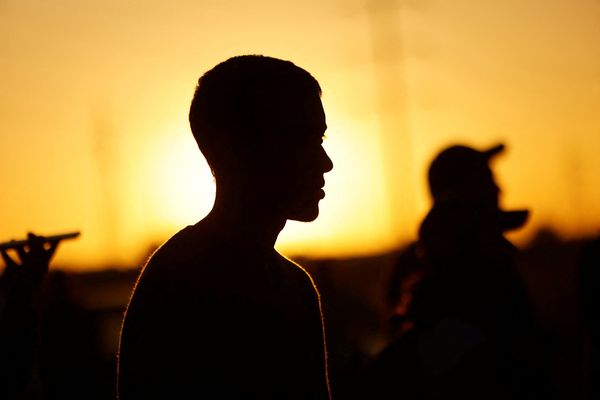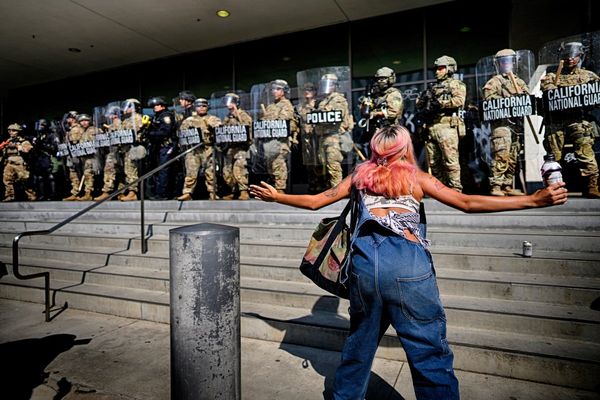
Miloš Degenek was 16, the temperature was minus eight degrees, and a jacket was not part of his sartorial repertoire. “I had, like, two pairs of trackies underneath one another, and then four jumpers,” he says, “because I didn’t have money to buy a winter jacket.”
Every day the budding Australian defender layered his clothes in this manner, then shivered his way through the 90-minute journey to VfB Stuttgart’s youth team training. Then, once it was done, he’d turn around and travel 90 minutes back.
“My first experience of professional football was being dropped in the middle of Germany and having to take an hour and a half to get to training in the middle of a freezing winter. My first professional contract was $1,000 a month, so I wasn’t earning big bucks.”
This is a World Cup like no other. For the last 12 years the Guardian has been reporting on the issues surrounding Qatar 2022, from corruption and human rights abuses to the treatment of migrant workers and discriminatory laws. The best of our journalism is gathered on our dedicated Qatar: Beyond the Football home page for those who want to go deeper into the issues beyond the pitch.
Guardian reporting goes far beyond what happens on the pitch. Support our investigative journalism today.
Degenek’s agent eventually bought him a jacket, but by then the most valuable lessons had already been learned. “Those struggles, that’s where I got that mentality,” says the now 28-year-old, who made his World Cup debut as a substitute against France on Tuesday.
“Where I thought to myself, ‘I’m training with another 20 guys but I want to be that one who goes on to make it’. I can say, fortunately enough, I am one of the ones that made it. There’s others in that group that did make it as well. One of them’s a guy called Kimmich, who’s not bad – I learned a lot from him even though he’s younger.”
That witty one-liner aside, Degenek is deadly serious. Struggle is in his blood, pumped from the ventricles of a heart that is uncommonly large not just by virtue of being an athlete.
He was 18 months old when his family sought refuge in Serbia, having fled his birthplace Croatia in the 1990s during the war of independence. Five years later they were on the move again, this time escaping the trauma of the Kosovo War. He ended up in western Sydney with a Red Star Belgrade jersey and not much else.
This background precipitates a certain level of perspective concerning simpler matters such as football. Concerning, specifically, Australia’s match against Tunisia in Qatar. After losing their opener4-1 to France, Saturday’s return to Al Janoub Stadium is effectively a must-win to stand a chance of getting out of Group D. A draw would leave them with a sliver of hope. A defeat would end the campaign.
We start now. Lion mentality @Socceroos @FIFAWorldCup Qatar you are amazing. 💪🏻⚽️🇦🇺❤️ pic.twitter.com/lebvBhDBcM
— Miloš Degenek (@milosdegenek45) November 13, 2022
“That’s not pressure,” says Degenek. “Pressure is me as a baby fleeing a war. Pressure is me as a six-year-old being in the middle of a war. Pressure is not ‘I must win a football game’. Because you can win or lose, but I don’t think anyone’s going to die.
“This is just the joy of wanting to get better, wanting to have something to say to your grandkids and your friends back home when you have coffee and say you won a game at a World Cup, you got out out of the group.
“Obviously we want to win the game, there’s no doubt about it, and I think we have it in our squad. If we match them in terms of intensity and desire I think we will win.”
Degenek, a centre-half who can also slot in at right-back, is not guaranteed to start. But he wants to. It’s obvious in the way he talks. He lives for games like this. For fighting not only the 11 Tunisians on the pitch but also the 40,000-odd others in the stands – the spirited contingent of expats in Qatar who went some way to helping their team draw 0-0 with Denmark.
“I’m not a technician,” he says. “I’m not a guy that’s gonna dribble at 10 players – I don’t have that ability in me. But I’ve got that heart and desire that no one else can match.”
He has big-game experience, too, having spent three years back in Belgrade with Red Star. In 2018, soon after signing, he helped seal the club’s improbable return to the Champions League after a 26-year absence, providing two assists in two minutes to rally from 2-0 down against Red Bull Salzburg in their final qualifying match. While they finished bottom of the group, he played a key role in a 2-0 win over Liverpool.
The Serbian SuperLiga and its rambunctious supporters further shaped what he calls his “lion mentality”. In June, before Australia’s successful World Cup qualifying playoff against Peru, he explained it to teammates.
“You either eat or you get eaten, that’s the simplest way to put it,” says Degenek, who recently signed with MLS outfit Columbus Crew. “I said to the boys: ‘There’s bread on the table, either we eat tonight – my kids, my wife and my family – or they eat and my kids and wife go home to sleep hungry. I don’t want that to happen.’”







